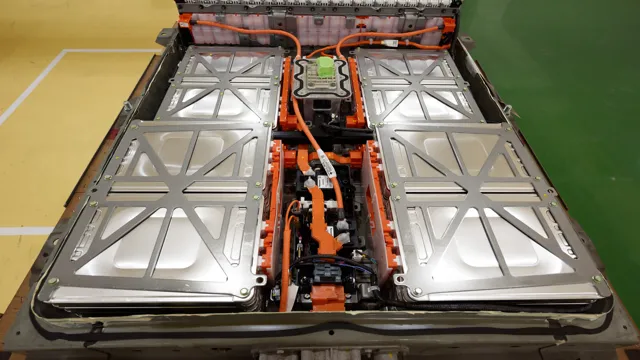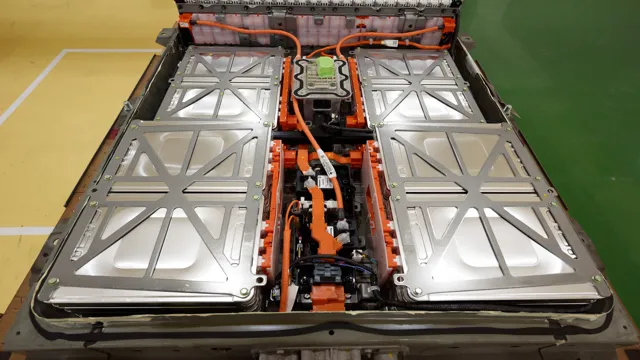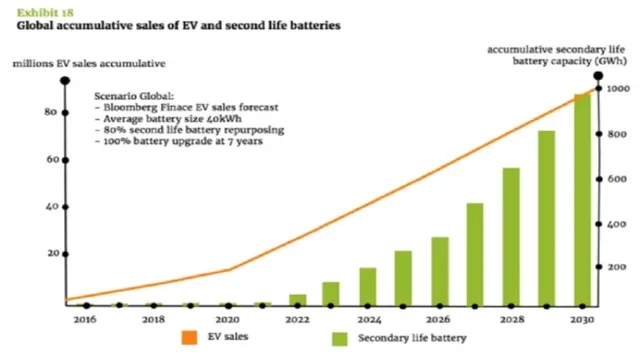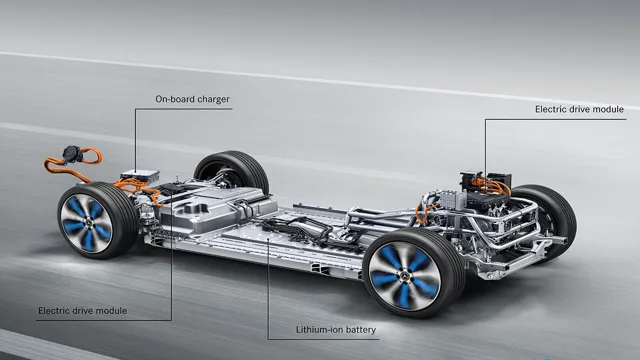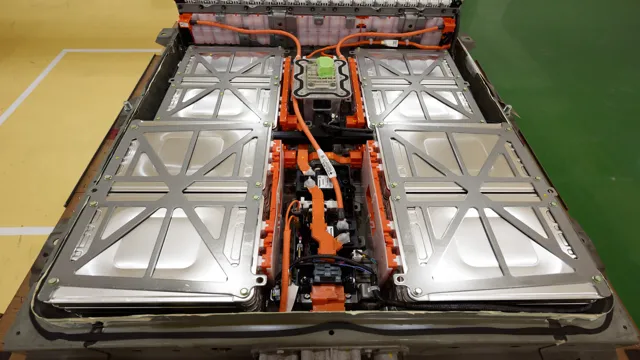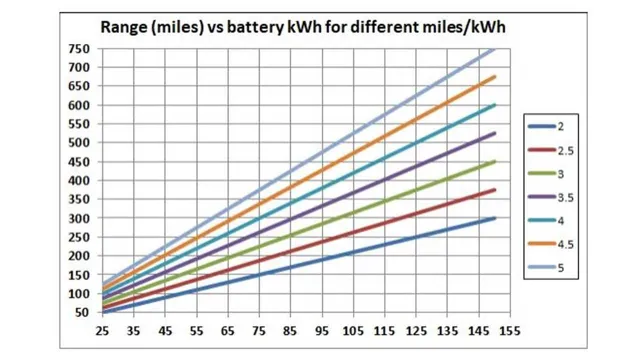The Shocking Truth About Electric Car Battery Voltage: Exploring the Power Behind Your EV
Electric cars have been making waves in recent years, offering a cleaner and more sustainable mode of transportation. However, one of the most critical components of an electric car is its battery, which is responsible for storing and delivering power to the vehicle’s electric motor. With advancements in technology, electric car batteries have become more efficient and powerful, allowing electric vehicles to travel further than ever before.
One crucial aspect of the battery is its voltage, measured in volts, which determines the amount of power it can deliver to the motor. But what exactly is an electric car battery volt, and how does it affect the car’s performance and range? Let’s dive deeper into the world of electric car batteries and explore the role that voltage plays in powering these exciting vehicles.
What are Electric Car Batteries?
Electric car batteries are the power source that propels EVs. The voltage of an electric car battery plays an essential role in determining the car’s performance. The battery pack comprises several individual cells that work together to store energy, generating a voltage of around 400 volts or more.
The battery voltage determines the amount of power that the electric motor can produce, which affects acceleration and top speeds. Electric vehicle batteries are designed to last long, provide greater efficiency, and enhanced safety features. Maintenance and replacement costs of electric car batteries can be high, but driving an electric car pays off in the long run due to lower fuel costs and fewer maintenance needs.
Composition of EV Batteries
Electric car batteries use a completely different technology than the lead-acid batteries found under the hood of conventional automobiles. EV batteries are rechargeable lithium-ion batteries that store electricity and power the electric motor that propels the car. They are made up of several individual cells connected in a series to achieve the desired voltage.
The cells themselves contain four main components: an anode, a cathode, a separator, and an electrolyte. The anode and cathode are made up of various metals and chemicals, while the separator prevents the two from touching and short-circuiting. The electrolyte allows for the flow of ions between the two electrodes.
Understanding the composition of EV batteries is critical for developing next-generation battery technologies that offer better performance, longer life, and safer operation.
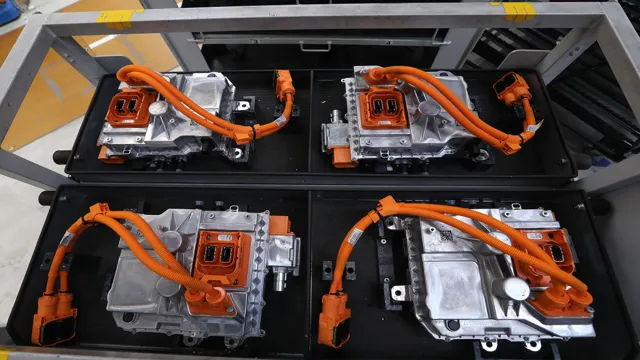
Battery Voltage Differences
Electric car batteries, also known as traction batteries, are the main source of power for electric vehicles. Unlike traditional lead-acid batteries, which are commonly found in gas-powered cars, electric car batteries are designed to provide high energy and power density for longer periods of time. One of the main differences between electric car batteries is their voltage.
The voltage of an electric car battery depends on the number of cells it contains, and each cell contributes approximately 6 volts to the total voltage of the battery. For example, a battery with 60 cells will have a voltage of 216 volts (60 cells x
6 volts). The voltage of an electric car battery is important because it affects the speed and range of the vehicle. A higher voltage usually means a higher top speed, while a lower voltage may result in shorter range and slower acceleration.
It is important to consider the voltage of an electric car battery when choosing an electric vehicle, as it can greatly affect the performance and driving experience.
Why is Battery Voltage Important?
Electric car battery voltage is an essential aspect of the overall design and efficiency of the vehicle. The voltage of an electric car battery determines how much power is available to the motor. Simply put, the higher the voltage, the more power the motor has to move the car.
A higher voltage also means the car can travel further on a single charge, making it more practical for long-distance driving. However, a higher voltage also requires the use of heavier and more robust components, adding weight and potentially reducing efficiency. Therefore, finding the right balance between voltage and other factors is critical in designing an electric car battery with optimal performance.
In summary, the electric car battery voltage is crucial as it affects the car’s power, range, weight, and overall efficiency, making it a key consideration when designing and manufacturing electric vehicles.
Electric Vehicle Range and Voltage
Electric vehicle range is one of the biggest concerns for people looking to make the switch from traditional gasoline-powered cars. This is why battery voltage is so important. The voltage of a battery directly affects the distance that an electric vehicle can travel on a single charge.
The higher the voltage, the farther the range. This is because higher voltage batteries can store more energy, allowing the vehicle to travel farther before needing to charge. It’s important to note that voltage is not the only factor that affects range, but it is a crucial one.
So when choosing an electric vehicle, it’s important to consider the battery voltage and its impact on the range.
Charging Time According to Battery Voltage
When it comes to charging your battery, the voltage is incredibly important. The voltage will determine how long it will take for your battery to get fully charged. The reason why voltage is so important is because it affects how much energy your battery can store and ultimately affects how quickly it can recharge.
The higher the voltage, the faster your battery will charge, but it’s important to remember that too much voltage can damage your battery or even cause it to explode. So, it’s essential to find the right balance between charging your battery quickly and making sure it stays healthy and safe. By paying attention to your battery voltage, you can make sure your battery gets charged in a timely manner without risking any harmful consequences.
Motor Power and Voltage Feedback
When it comes to electric motors, battery voltage plays a crucial role in their performance. Essentially, the higher the voltage, the more power the motor can output. This is because voltage directly correlates with the speed of the motor’s rotation, which in turn affects torque and horsepower.
A higher voltage battery also allows the motor to maintain its speed under heavier loads, improving efficiency and preventing overheating. However, it’s important to make sure that the motor’s controller can handle the higher voltage, as exceeding its limit can lead to damage. In short, battery voltage is an important factor to consider when choosing an electric motor, as it can greatly impact its power, efficiency, and overall performance.
Future of EV Batteries
The future of electric vehicle (EV) batteries is looking bright, with advancements in battery technology being made every day. The electric car battery volt is a crucial component in the performance of an EV. Higher voltages mean greater power output, which translates into faster acceleration and longer ranges.
The latest EV batteries are designed with higher voltage capabilities, which provides a more efficient energy transfer from the battery to the motor. This results in a better driving experience for EV owners and a faster transition to a more sustainable future. With the growing demand for EVs, battery manufacturers are racing to create the next breakthrough in battery technology.
The future may see EV batteries that can charge faster and hold more energy, thus making EVs more practical for longer journeys. One thing is for sure, as technology advances so will the capabilities of EV batteries bringing us one step closer to a greener, cleaner future.
Increasing Battery Voltages in Newer Electric Cars
The future of EV batteries is looking promising as newer electric cars are increasing their battery voltages. With higher voltages, EVs can travel longer distances on a single charge, making them more practical for everyday use. As technology advances, manufacturers are finding ways to increase the overall efficiency of EV batteries, allowing for even greater ranges.
But what does this mean for the consumer? Well, it means that owning an electric car is becoming a more appealing option, especially for those looking to reduce their carbon footprint and save money on gas. With higher battery voltage, the need for frequent charging is greatly reduced, making long drives much more feasible. Of course, with any new technology, there are still hurdles to overcome.
One major concern is safety. Higher voltage batteries can pose a greater risk of fire and electrical shock. Manufacturers are taking steps to mitigate this risk with improved safety features and training for mechanics.
Overall, the future of EV batteries looks bright. With increasing battery voltage and improved efficiency, electric cars will become even more practical and mainstream. And with the ever-increasing focus on sustainability, it’s clear that electric cars will continue to play an important role in transportation for years to come.
Expected Improvements in Battery Voltages
The future of EV batteries is looking promising, with expected improvements in battery voltages. These advancements in battery technology could lead to increased driving ranges for electric vehicles and faster charging times. Battery manufacturers are continuously working on developing new materials and designs to improve the performance of batteries.
One such innovation is the development of solid-state batteries, which could potentially have higher energy densities and faster charging times than traditional lithium-ion batteries. Additionally, researchers are exploring the use of new materials such as silicon anodes and lithium-sulfur batteries to increase the energy density of batteries and improve their performance at low temperatures. While these advancements are exciting, it’s important to note that there is still a long way to go in terms of making EV batteries more efficient and cost-effective.
However, as more and more automakers shift towards electrification, the demand for improved battery technology will continue to grow. In conclusion, the future of EV batteries looks bright, with expected improvements in battery voltages and the development of new technologies such as solid-state batteries and new materials. With these advancements, electric vehicles will become more practical and affordable for the average consumer, paving the way for a greener and more sustainable future.
Conclusion
In conclusion, the voltage of an electric car battery is like the electricity flowing through a cleverly constructed joke. Just as a joke needs the perfect combination of wit and timing to deliver its punchline, an electric car battery requires the right amount of voltage to power its engine and propel it forward. Without the proper voltage, both a joke and electric car battery fall flat.
So, let’s make sure our electric cars have the right voltage and keep driving towards a brighter, more sustainable future.”
FAQs
What is the typical voltage range of an electric car battery?
The typical voltage range of an electric car battery is between 300 and 400 volts.
How long does it take to fully charge an electric car battery?
The time it takes to fully charge an electric car battery varies depending on the charging method and the battery capacity. For example, using a level 1 charger could take up to 20 hours, while a level 3 fast charger can provide up to 80% charge in just 30 minutes.
Can you replace just one cell in an electric car battery pack, or do you need to replace the entire pack?
It is possible to replace a single cell in an electric car battery pack, but it can be a difficult and expensive process. In many cases, it may be more practical to replace the entire pack.
How does the temperature affect the performance of an electric car battery?
Extreme temperatures, either hot or cold, can have a negative impact on the performance and lifespan of an electric car battery. High temperatures can cause the battery to degrade faster, while very low temperatures can reduce its capacity and power output. Electric cars often have a battery management system to regulate the temperature and extend the life of the battery.
